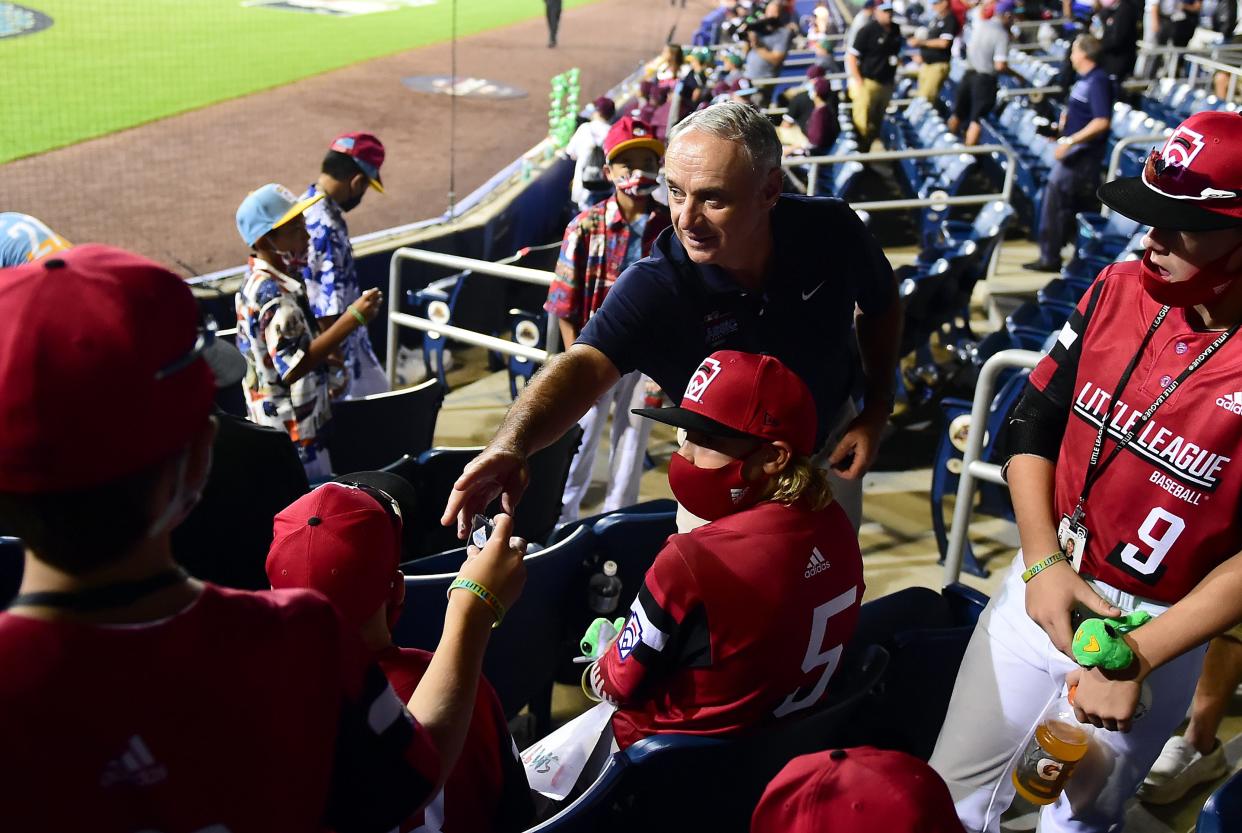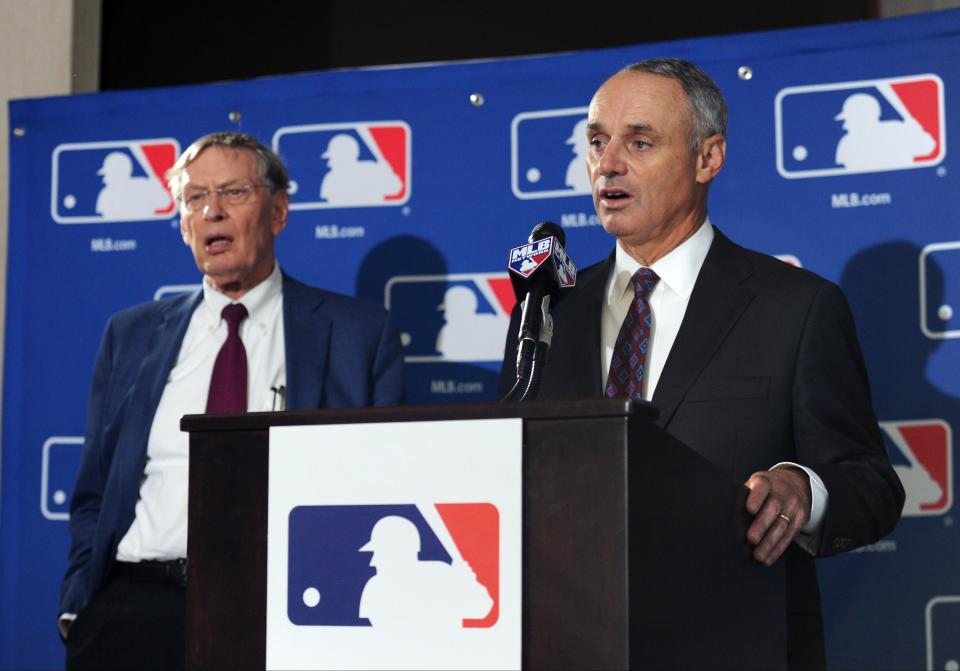Michael Arace: MLB commissioner 'Bud Light' imposes player lockout as preemptive strike

- Oops!Something went wrong.Please try again later.
- Oops!Something went wrong.Please try again later.
The collective bargaining agreement between Major League Baseball owners and the MLB Players Association expired at the end of Wednesday, or at the start of Thursday, depending on one’s view of “midnight.” Three minutes later, at 12:03 a.m. Dec. 23, commissioner Rob Manfred posted a “letter to baseball fans” to explain why MLB was “forced” to impose a “defensive lockout.”
Manfred writes, “Delaying this process further would only put Spring Training, Opening Day, and the rest of the season further at risk — and we cannot allow an expired agreement to again cause an in-season strike and a missed World Series, like we experienced in 1994. We all owe you, our fans, better than that.”
Manfred rushed to beat the union into the court of public opinion. It’s good PR. Conjuring the strike of 1994, which notoriously scuttled the World Series, hit the perfect note. It suggests that millionaire strikers are villainous while billionaire owners are nothing but benevolent custodians of the game.
The owners scrubbed their websites, erased mugshots on stats pages, flushed away player news, froze contract negotiations and closed all of their facilities. It’s not a strike.
The lockout is leverage. The owners believe they can break the union and maybe even make the players swallow a salary cap, like they tried to do in 1994. They believe that by striking fear of a strike into the hearts of baseball fans, they will have public opinion on their side.
Strikes are evil. That is what 1994 teaches us, right?
Bud Selig, who had a documented history of colluding to suppress salaries while owner of the Milwaukee Brewers, was the interim commissioner. He was the poster boy for bad faith. He was collective-bargaining poison.
The owners wanted a salary cap and hand-picked a hatchet man to replace Selig as chief negotiator. They stopped paying pensions and benefits. They lobbied the Senate Judiciary committee to kill proposed anti-trust legislation, a crushing blow to the players (and, well, reason).
By the summer of 1994, the players felt pressed to set a strike date of Aug. 12, and they stuck to it. The postseason was canceled and the game was scarred. The owners responded by unilaterally implementing a salary cap, eliminating clubs’ rights to negotiate and sign free agents and announcing that replacement players would be used for the 1995 season.
Resolution came only after the National Labor Relations Board found the owners in violation of labor law, which led a federal district judge (Sonia Sotomayor, now a Supreme) to rule that the owners were indeed playing dirty. An injunction was issued. The players offered to come back to the bargaining table unconditionally.
Twenty-six years later, Manfred is talking about a “defensive lockout” as if the owners played no part whatsoever in the strike of 1994. Like, their hands were clean.

Manfred is the same guy who used the pandemic as a platform to contract and restructure the minor leagues. It saved MLB owners a few bucks. It also killed 42 franchises, savaged minor league owners and fans and burned grassroots growth of the game in traditional, if small and far-flung, markets.
There was no negotiation.
Baseball’s biggest problem is there hasn’t been a real commissioner acting “in the best interest of the game” since Faye Vincent was fired in 1992. Manfred is just another Selig, but with a better haircut and no mustard stains on his neckties. He’s Bud Light.
Stars are always going to get paid; last month, nearly $2 billion in free-agent contracts were signed — and around $1.3 billion of it went to 10 players — before the “defensive lockout” closed the bank.
Obviously, the owners have no problem with this. The players don’t seem to be worried about it, either. Where’s the rub?

The rules defining free agency and arbitration eligibility have remained largely unchanged for decades. This stasis, when combined with advanced metrics, has led to a system where the average length of a career is declining, fewer players are reaching arbitration and, when/if they do reach arbitration, their careers are in decline.
The stars are getting paid more. Nobody else is. Some owners are tanking. It's cheaper.
The players want an overhaul of free-agent and arbitration rules, higher luxury-tax thresholds and mechanisms to force teams to be more competitive. They want more of the rank-and-file to share the wealth.
The owners think the players have a great system — no salary cap! The owners have radically different ideas of what to do about free agency, arbitration, luxury taxes and competitive balance. They don't see why the system should benefit the rank-and-file.
Both sides say they want to curb tanking by teams that collect luxury taxes and don’t spend it on talent. The Cleveland Guardians are an example. They dropped not a penny on a major-league free agent last month as they hammered out a deal to extend their lease at Progressive Field, a deal that includes public tax dollars for stadium improvements.
Guardians fans are asking, "Can I get a bat with that?"
Baseball has a lot of problems. Old-timers barely recognize, or relate to, the game. There’s no action. World Series ratings dipped to an all-time low in 2020 and didn’t make a gigantic leap in 2021. Gen Z might disappear down a stream at any moment. There’s no action.
A labor war ought to fix everything.
This article originally appeared on The Columbus Dispatch: Major League Baseball has bigger problems than collective bargaining

